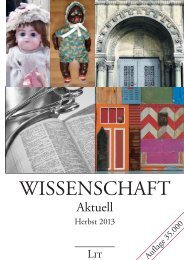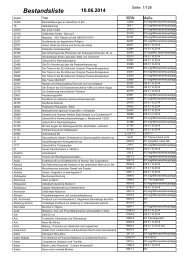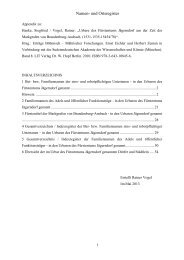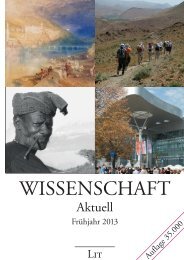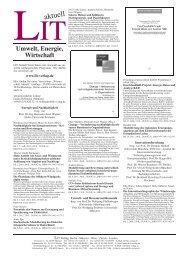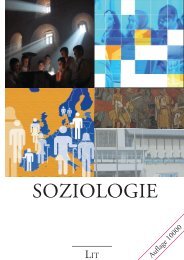Sprachen und Literaturen 2003 - LIT Verlag
Sprachen und Literaturen 2003 - LIT Verlag
Sprachen und Literaturen 2003 - LIT Verlag
Sie wollen auch ein ePaper? Erhöhen Sie die Reichweite Ihrer Titel.
YUMPU macht aus Druck-PDFs automatisch weboptimierte ePaper, die Google liebt.
Beiträge zur Afrikanistik<br />
hrsg. von Prof. Dr. H. Ekkehard Wolff (Leipzig) <strong>und</strong><br />
Hilke Meyer-Bahlburg (Hamburg)<br />
Kahombo Mateene<br />
Essai de Grammaire du Kih<strong>und</strong>e<br />
Syntaxe, Morphologie et Phonologie Mélangées<br />
Bd. 1, 1992, 260 S., 45,90 €, br., ISBN 3-8974-096-x<br />
Ekkehard Wolff �<br />
Referenzgrammatik des Hausa<br />
Bd. 2, 2. überarb. Aufl. Frühj. <strong>2003</strong>, ca. 592 S., ca. 35,90 €, br.,<br />
ISBN 3-89473-334-9; 70,90 €, gb., ISBN 3-8258-2026-2<br />
Bettina de Campos<br />
Die Kompositionstechnik der Hausa Sängerpoeten<br />
Interrelation von Funktion <strong>und</strong> Form in einem Genre<br />
westafrikanischer Oralliteratur<br />
Bd. 3, 1994, 276 S., 35,90 €, br., ISBN 3-8258-2144-7<br />
Cornelia Khamis<br />
Mehrsprachigkeit bei den Nubi<br />
Das Sprachverhalten viersprachig aufwachsender Vorschul- <strong>und</strong><br />
Schulkinder in Bombo/Uganda<br />
Bd. 4, 1995, 280 S., 35,90 €, br., ISBN 3-8258-2321-0<br />
Jan J. de Wolf (Ed.)<br />
Bukusu Tales<br />
Collected by assistants of Günter Wagner<br />
Bd. 5, 1995, 100 S., 17,90 €, br., ISBN 3-8258-2399-7<br />
Sigrid Seelmann<br />
Liebe, Tod <strong>und</strong> Wahnsinn<br />
Das Selbstbild der Erzählerfigur in ausgewählten Beispielen der<br />
afrikanischen Literatur<br />
Bd. 6, 1997, 296 S., 24,90 €, br., ISBN 3-8258-2785-2<br />
Rose-Juliet Anyanwu<br />
Aspects of Igbo Grammar<br />
Phonetics, Phonology, Morphology and the Tonology of Nou<br />
Bd. 9, 1998, 216 S., 24,90 €, br., ISBN 3-8258-3233-3<br />
Abel Yamwaka Mreta<br />
An Analysis of Tense and Aspect in Chasu<br />
Their Form and Meaning in the Affirmative Constructions<br />
Bd. 10, 1998, 208 S., 35,90 €, br., ISBN 3-8258-3719-x<br />
Gerald Heusing<br />
Aspects of the Morphology-Syntax Interface in Four<br />
Nigerian Languages<br />
A Cross-Linguistic Study of Fulfulde, Igbo, Lamang,<br />
and Mupun<br />
Bd. 11, 1999, 176 S., 25,90 €, br., ISBN 3-8258-3917-6<br />
Ayo Bamgbose<br />
Language and Exclusion<br />
The Consequences of Language Politics in Africa<br />
Ayo. Bamgbos.e’s new book focuses on the problem of language<br />
exclusion arising from language policies, particularly in countries<br />
in Sub-Saharan Africa. The collection is based on a set of lectures<br />
given in South Africa in March 1998. The individual chapters largely<br />
preserve the style of presentation. This makes it a very readable book<br />
and an easy-to-read introduction to some of the salient points of<br />
African sociolinguistics. Because of the original audience for which the<br />
lectures were intended, special references to the South African language<br />
situation will be fo<strong>und</strong>. In its Appendices, the book offers access to<br />
some of the most important documents on language policies such as<br />
the OAU’s Language Plan of Action For Africa (1986), the language<br />
provisions in the Constitution of the Federal Republic of South Africa<br />
(1996), and from the Barcelona Universal Declaration on Linguistics<br />
Rights.<br />
“The new book of Africa’s most prolific and eloquent elder in the field<br />
of African sociolinguistics is a splendid introductory text for the noninitiated<br />
as much as a must for the initiated. It highlights salient issues<br />
with regard to the ubiquitous multifacetted and still largely unresolved<br />
‘language question’ in Africa, that is ‘the pervasive effect of exclusion<br />
that is attendant on language policies in most African countries’, as<br />
the author himself puts it.” H. Ekkehard Wolff (Professor of African<br />
Languages and Linguistics, Institut für Afrikanistik, University of<br />
Leipzig)<br />
Bd. 12, 2000, 160 S., 19,90 €, br., ISBN 3-8258-4775-6<br />
Elhadji Ari Awagana �<br />
Grammatik des Buduma<br />
Phonologie, Morphologie, Syntax<br />
Die Buduma-Sprache, eine tschadische Sprache in Zentralafrika ist in<br />
der wissenschaftlichen Literatur schon bekannt (z. B. Lukas 1939), aber<br />
bislang nur mangelhaft beschrieben worden. Dieses Buch enthält eine<br />
umfassende Studie der Sprache hinsichtlich der phonologischen<br />
<strong>und</strong> grammatischen Struktur im Sinne einer zeitgemäßen sprachwissenschaftlichen<br />
Beschreibung. Die Studie thematisiert außerdem die<br />
Kontaktsituation mit der Nachbarsprache Kanuri <strong>und</strong> stellt verlässliche<br />
Identifikationen der Interferenzen aus dieser Sprache in allen Teilbereichen<br />
des sprachlichen Systems heraus.<br />
Bd. 13, 2002, 272 S., 20,90 €, br., ISBN 3-8258-5644-5<br />
Afrikanistik<br />
AFRIKANISTIK<br />
Forschungen zu <strong>Sprachen</strong> <strong>und</strong> Kulturen Afrikas/<br />
Researches on African Languages and Cultures/<br />
Recherches sur les Langues et les Cultures<br />
Africaines<br />
hrsg. von Prof. em. Dr. Rüdiger Schott<br />
Franz Kröger<br />
Buli-English Dictionary<br />
With an Introductory Grammar and an Index English – Buli<br />
Bd. 1, 1992, 584 S., 40,90 €, br., ISBN 3-88660-821-2; 76,90 €, gb.,<br />
ISBN 3-88660-820-4<br />
Rüdiger Schott<br />
Bulsa Sunsuelima – Folktales of the Bulsa in Northern<br />
Ghana<br />
Series S: Folktales of the Supernatural<br />
Vol. 1: Tales of the Sky-God (Wen, Naawen) Part I<br />
Bd. 2, 1993, 420 S., 40,90 €, br., ISBN 3-89473-616-x; 76,90 EURofc,<br />
gb., ISBN 3-89473-971-1<br />
Ulrike Blanc<br />
Lieder in Erzählungen der Bulsa (Nordghana)<br />
Eine musikethnologische Untersuchung.<br />
Songs in Folktales of the Bulsa (North Ghana). A study in the<br />
ethnology of music<br />
Bd. 3, 1993, 160 S., 24,90 €, br., ISBN 3-89473-969-x<br />
Rüdiger Schott<br />
Bulsa Sunsuelima – Folktales of the Bulsa in Northern<br />
Ghana<br />
Series S: Folktales of the Supernatural<br />
Vol. 1: Tales of the Sky-God (Wen, Naawen), Part II–III<br />
Bd. 4, 1996, 566 S., 40,90 €, br., ISBN 3-8258-2499-3; 76,90 €, gb.,<br />
ISBN 3-8258-2500-0<br />
Ronald P. Schaefer; Francis O. Egbokhare (eds.)<br />
Oral Tradition Narratives of the Emai People<br />
This collection of seventy prose of narrative samples represents<br />
the only published record of the oral tradition of the Emai people<br />
of southern Nigeria. The narratives are presented in both Emai<br />
orthography and English translation. They tend to portray everyday<br />
cultural practices of the Emai with human characters or their animal<br />
personification. As such, they provide an initial glimpse of Emai<br />
cosmology, cultural values and social norms as well as a firm<br />
impression of how Emai grammatical resources function in spontaneous<br />
narrative discourse.<br />
Bd. 5 (2 vols.), 1999, 1288 S., 97,90 €, br., ISBN 3-8258-4030-1<br />
Ulrike Blanc<br />
Musik <strong>und</strong> Tod bei den Bulsa (Nordghana)<br />
Ebensowenig wie das Leben ist der Tod ohne Musik vorstellbar. Was<br />
für die Bulsa im Norden Ghanas “Musik” ist <strong>und</strong> welche Bedeutung<br />
sie im Alltag <strong>und</strong> im Rahmen von Ritualen hat, macht diese Studie anhand<br />
der Totengedenkfeiern deutlich. Diese Feiern, die in jeder Hinsicht<br />
die elaboriertesten Ereignisse im Jahreszyklus <strong>und</strong> im Leben der Bulsa<br />
sind, werden unter musikethnologischen Gesichtspunkten untersucht <strong>und</strong><br />
in ihren gesamtgesellschaftlichen Zusammenhang gestellt. Die Autorin<br />
zeigt, daß Musik nicht schmückendes Beiwerk ist, sondern sozialen<br />
<strong>und</strong> religiösen Normen unterliegt, ihre Funktionen erfüllt <strong>und</strong> sowohl<br />
Ausdruck als auch konstituierender Teil der Gesellschaft ist.<br />
Bd. 6, 2000, 312 S., 25,90 €, br., ISBN 3-8258-4437-4<br />
Getie Gelaye<br />
Peasants and the Ethiopian State<br />
Agricultural Producers’ Cooperatives and their Reflections in<br />
Amharic Oral Poetry. A Case Study in Yetnora, East Gojjam,<br />
1975- 1991<br />
Composing, reciting and improvising poetry is a common practice<br />
in the Ethiopian countryside where an Amharic-based political<br />
communication culture provides a sophisticated medium for expressing<br />
intricate ideas. Among the most interesting features of the Amharic<br />
language, which is known for its poetic encoding of dissent, is its<br />
ambiguity. The passion for speculative allusions and double-talk can be<br />
seen as a central characteristic of the Ethiopian peasant-culture which<br />
plays with innuendo and hidden meanings, without transgressing the<br />
bo<strong>und</strong>aries of formal norms for polite communication. An investigation<br />
of Ethiopia’s recent agrarian reforms as reflected in Amharic oral<br />
poetry represents an innovative approach which has yielded fascinating<br />
insights. Taking Yetnora Agricultural Producers’ Cooperative as an<br />
example, Getie Gelaye provides a most informed and convincing<br />
account of peasant attitudes as reflected in oral poetry.<br />
Bd. 7, 2001, 232 S., 25,90 €, br., ISBN 3-8258-4683-0<br />
Jan Jansen<br />
The Griot’s Craft<br />
An Essay on Oral Tradition and Diplomacy<br />
Griots, the West African traditional bards, have attracted scholarly<br />
attention for decades because of their apparently infinite knowledge<br />
of history and their positions as social mediators. Academic research<br />
has thus focused on their verbal skills, their memory, their music<br />
and the meaning of their texts. Their diplomatic skills as mediators,<br />
however, have never been the object of systematic analysis. This<br />
book aims to fill that lacuna by examining how griots deal with both<br />
social relationships and the transfer of knowledge, thus illustrating<br />
why griots play such an important role in Mande societies. Griots<br />
are more than mere ‘storytellers’ or ‘entertainers’. The subtle art of<br />
diplomatic mediation in integral to their craft. Jan Jansen elaborates his<br />
ideas on the basis of observations made during two years of research<br />
conducted among the prestigious bards of Kela (Mali). By using an<br />
interactionist approach, he demonstrates how griots create – both<br />
–16–<br />
physically and metaphorically – a space to work in, and how they<br />
shape social relations – for which the creation of alleged historial<br />
texts is a prerequisite – through which conflicts are communicated and<br />
subsequently resolved.<br />
“Jansen is the first scholar to provide us with extensive insight into<br />
‘jelikan’ (griot speech) as social practice and function. Jansen’s<br />
arguments attack many long-accepted views of Mande oral tradition<br />
and will <strong>und</strong>oubtedly raise controversy, but they are so<strong>und</strong>ly based<br />
on extensive and sensitive fieldwork.” (Ralph A. Austen, Professor of<br />
African History, University of Chicago)<br />
Bd. 8, 2000, 120 S., 15,90 €, br., ISBN 3-8258-4352-1<br />
Getie Gelaye<br />
Amharic Oral Poems of the Peasantry in East Gojjam<br />
Text, Classification, Translation and Commentary<br />
This book deals with the poetic traditions and performance of the<br />
peasants of East Gojjam in Northwest Ethiopia and presents the<br />
major genres of Amharic oral poetry in original and translation and<br />
commentary in English. The study provides fieldwork strategies,<br />
methodological issues and a critical review of the contributions of<br />
European and Ethiopian scholars to the study of Amharic oral poetry.<br />
It also describes major performance occasions such as agricultural<br />
work parties, religious festivals, weddings, funeral ceremonies, cattle<br />
herding and local public gatherings where Amharic poems and songs<br />
are composed, recited, sung and improvised. The study presents a<br />
total of 260 Amharic poems and songs classified <strong>und</strong>er ten major<br />
categories: war songs, heroic recitals, grievance poems, cattle herders’<br />
and children’s songs, wedding songs, work songs, religious songs,<br />
funeral poems, praise poems of the patriots, and contemporary and<br />
historical poems. Explanations and commentaries are also provided on<br />
local and cultural expressions based on the social, cultural, religious,<br />
historical and communicative contexts of the rural people and the<br />
interviews and discussions conducted with selected informants and<br />
singers.<br />
Bd. 9, 2001, 160 S., 20,90 €, br., ISBN 3-8258-5223-7<br />
Monographs from the International African<br />
Institute (London)<br />
S. M. Muniko; B. Muita oMagige; M. J. Ruel (eds.)<br />
Kuria-English Dictionary<br />
1996, 152 S., 24,90 €, br., ISBN 3-8258-2951-0<br />
Dennis G. Fowler<br />
A Dictionary of Ila Usage<br />
1860 – 1960<br />
2000, 896 S., 101,90 €, gb., ISBN 3-8258-4767-5<br />
Dennis G. Fowler �<br />
The Ila Speaking<br />
Records of a lost world<br />
2002, 232 S., 25,90 €, br., ISBN 3-8258-6115-5<br />
Arbeitsmaterialien zur Afrikanistik<br />
Joseph A. McIntyre; Hilke Meyer-Bahlburg<br />
Arbeitsvokabular Deutsch – Haussa<br />
Bd. 1, 1999, 88 S., 10,90 €, br., ISBN 3-8258-4243-6<br />
Amsalu Aklilu �<br />
Deutsch – Amharisch<br />
Wörterbuch<br />
Bd. 2, Frühj. <strong>2003</strong>, ca. 656 S., ca. 101,90 €, br., ISBN 3-8258-6198-8



